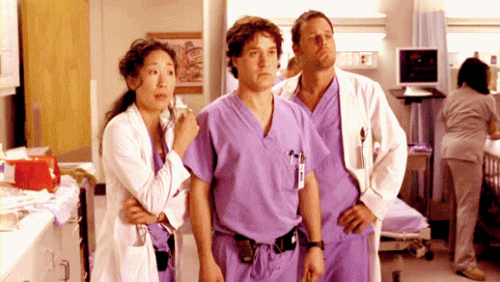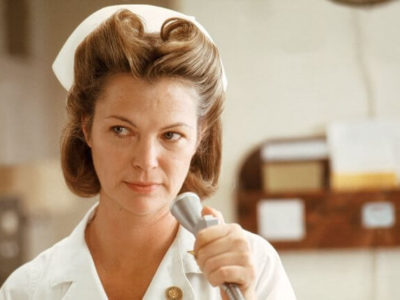Germs and needles and blood, oh my! Get your scrubs ready because you’re in for a trip to the doctor’s. If you’re looking to be a nurse, this major is pretty much the only route you can take, but can also be a stepping-stone to other medical professions. Nursing majors should get ready to memorize and understand a crap load about the life sciences and medical terms because most nursing programs expect their students to maintain high GPAs. Starting to feel the pressure yet? Good because there’s potential for high stress situations when caring for the sick and disabled.
What you’ll be doing

Before you’re even accepted into a nursing program, you’ll have to ace your prerequisites, including biology, chemistry, microbiology and anatomy. “Stay focused,” said Caroline Mozo, a sophomore on the nursing track at Florida State University. “It is a science major so there will be tough classes,” Mozo said. “I get excited when I see the upperclassmen around campus in their scrubs, and I can’t wait for that to be me so I can get some hands-on experience.” Once you’re ready to move on to upper level classes, you’ll be fully immersed into the nursing experience, and will start trying out the different kinds of nursing through clinicals.
Upsides

1. “There is always going to be a demand for nurses and now nurses are being given more responsibilities and opportunities to move up in the field. For example, I want to be a nurse practitioner and both nurse practitioners and physician’s assistants are becoming primary health care providers, having their own offices, seeing their own patients, moving from just patient care and comfort to also diagnosing, which I think is really awesome.” – Caroline Mozo, Sophomore, Florida State University
2. “I loved the hands-on experience you gain while on clinicals because you get a feel for how it will really be in the work place. It’s a great, satisfying career to know you’re saving lives.” –Andres Luces, Broward College 2012 (RN), Florida International University 2014 (BSN), Cleveland Clinic
3. “You can go into just about anything with a couple years of experience under your belt. You have the opportunity to be in sales, nursing research, and there are also a lot of different areas in nursing. If you like children you can be a pediatric nurse or if you like acute care you can work in an ICU. You can do many things with a nursing degree.” –Kelli Muñoz, Florida International University 2013, Nicklaus Children’s Hospital and Joe DiMaggio Children’s Hospital
Downsides

1. “A downside is that the major is very time consuming. I probably won’t be able to keep my job or much of a social life even. The biggest challenge is that there is not much room for mistakes. You have to maintain a very high GPA, which is very difficult, so the advice I would give to someone starting the major is to be prepared.” – Casie Rose, Junior, Florida State University
2. “Time management. It was difficult to find a balance between my school, work and personal life. It eventually gets better, but it was the hardest part besides the long hours of studying.” -Andres Luces, Broward College 2012 (RN), Florida International University 2014 (BSN), Cleveland Clinic
3. “The biggest challenge I faced in my studies was learning everything in such a short period of time. It’s a lot of information that can be challenging to remember when you don’t have actual floor experience yet.” -Kelli Muñoz, Florida International University 2013, Nicklaus Children’s Hospital and Joe DiMaggio Children’s Hospital
Career Opportunities

Believe it or not, you can do a lot more than just rock a pair of awesome scrubs. Careers are available for nursing majors in and out of the ER.
1. Nurse
Ok, so maybe you saw this one coming. Look at the reality, though. Nurses can work in so many places like hospitals, schools, rehabilitation centers, doctor’s offices and that’s just to name a few. At hospitals, nurses can work in different wards like maternity, pediatrics, ICU, neurology, cardiology and many more. The possibilities are endless and there’s a happy place for every nurse.
2. Head Nurse
If you like bossing people around, then this may be the position for you. The head nurse is in charge of overseeing a team of nurses and making sure they get their work done properly. They have a lot more paperwork and try to keep a ward functioning properly. Work your way up the ladder, and get ready to apply what you learned as a nursing major to the administrative and managerial duties of a head nurse.
After a few years of nursing experience under your belt, maybe you’re craving that white coat swag. Medical school is competitive, and previous medical experience is sure to give you an edge. Make sure your pre-med prerequisites are taken care of, send out the applications and see yourself off to medical school. Your nursing studies will give you a wider perspective of the medical field and help you to understand the different factors that come into play when caring for a patient.
4. Professor
If you like your summers off, then this may be the route for you. Take your education a step further by earning a master’s degree in nursing, and voila, you can teach nursing. You’ll also know tons about the human body, so you can also get a teaching certificate, teach anatomy to high school kids and inspire future nurses.
5. Salesperson
Studying nursing provides you with a plethora of information about the medical field. If the traditional nursing route isn’t your thing, use all the information you learned to go into sales. You can become a pharmaceutical representative and sell medicine to doctors with a clear understanding of what it can do for patients. You can also sell medical equipment to doctors, hospitals and surgical centers.
Everything Else You Need to know about the nursing major
By Zoë Kanfelc
What You’ll Be Doing

Finally passed your prerequisites? We all see nurses in dramatic life-saving situations on TV, but what does their actual day-to-day life consist of? As a nurse, you may administer medication, consult with other healthcare providers, monitor patients, educate individuals and family and hold responsibility for important records. “We treat patients thinking that we will be the educators, but more often than not, your patients are the ones teaching you,” Pennsylvania College of Health Sciences graduate Kristin Beard said. Because injury and illness have no time restrictions, many nurses work on weekends and certain holidays. While they can work in hospitals, location will not always be set in stone. They can work in clinics, ambulances, offices and critical care too. This career built on caring helps people who are problem solvers, critical thinkers and compassionate people thrive in the work force.
The classes you’ll take

When deciding to declare a nursing major, you will realize it takes a lot of work. Many undergraduate nurses take classes in the sciences. Get ready to take chemistry, basic nutrition, human anatomy, physiology, human development, microbiology, nursing sciences classes, communication and pharmacology. Quite a mouthful of a schedule, huh?
Depending on what program you decide to do, your classes may vary. However, the list above provides a general idea of what to expect. As you begin to take more specialized classes, a nursing student will participate in clinicals. Experiences in doctor’s offices, emergency rooms, hospitals or clinics help you get a feel for what you are actually doing. Many schools built their own labs and clinics where students can practice different things. The technology makes learning in a classroom very hands-on without the fear of hurting a real human before you feel ready. Once you graduate, you will also pass the National Council Licensure Examination (NCLEX) before you can start officially working as a nurse.
Internships for Nursing

Want real life experiences? Lots of options for nursing students shed light when it comes for internships. College students and graduated alumni of all majors will agree that internships make an amazing way to get experience in your interested field. Internships will give you experiences and knowledge from working in the real workforce that classroom lectures and clinicals will just not give you. Opportunities to work with registered nurses in intensive care units or in the hospital room. Many internships require you to work under supervision of other nurses and actually provide hands-on care services to patients in need. “I have been working in an extended care facility working with geriatric patients. This experience has been very eye opening to what the geriatric community goes through on a daily basis when they can’t do things for themselves and how frustrating that must be. It has taught me patience,” PA College of Health Sciences sophomore Samm Ernst said. Who knows, your internship might just land you your dream job working as a hot shot in a big hospital.
Career Opportunities

Want to specialize in the nursing field? The hundreds of options right at your fingertips for nursing majors should get you excited about your major and your career. From traveling to specialization in nursing homes, nurses work in every aspect of life to make it as enjoyable as possible. Take a look at these 5 nursing specializations to get pumped up about.
1. Research Nurse
Research nurses dedicate their life to evaluation, creating and perfecting current common medical practices, treatments and medications for all medical problems. Research nurses prepare evaluations of subjects and track their results as well as provide support for cleaning instruments and administer medication to subjects. Most research nurses work in the pharmaceutical and medical research labs. If you communicate well, can embody patience and love exploring the unknown then consider research.
2. Traveling Nurse
Many travel nurses partner with a company and provide medical services to their coworkers all over the world. Others partner with non-profits and administer care to people in third-world countries. As a travel nurse, you don’t worry about staff meetings, going to in-services or sitting on committees. Keeping care of patients comes as your top priority 24/7. After one year of experience, you can look for companies that hire nurses to travel with their workers. Sometimes they will send you do cool new cities all around the world and to tropical getaways, all part of the job.
3. Cruise Ship Nurse
Want a permanent staycation? Apply as a cruise ship nurse. A cruise ship nurse means a rewarding career but a change of scenery. In order to work as a nurse on the cruise ship, you’ll need special licensing and requirements. Most cruise ships require a nurse to experience three years in the field and advanced cardiac life support training. Cruise ship nurses deal with cardiac arrest, first aid, sea sickness and bad sun burns.
4. Nurse Anesthetist
Nurse anesthetists work a rewarding job due to personal satisfaction, benefits and a very nice salary. Nurse anesthetists take on a similar responsibility as anesthesiologists. This includes giving general and local anesthetics, spinal and nerve blocks and performing epidurals. It takes about seven years of higher education to deliver anesthetic. You also have to pass a certified registered nurse anesthetist (CRNA) exam which requires 2,500 clinical hours and administering 850 anesthetics.
5. Pediatric Nurse
Does working with babies and teenagers seem like a dream come true? This awesome job will spark your interest if you want to work with children. Pediatric nurses work with children ranging from newborns to 19-years-old. They provide a variety of care for all age groups and it requires a lot of change. No day resembles another, especially when it comes to children and their growing bodies. Many times, pediatric nurses regularly take patients’ heights, weights and development patterns. Nurses will work with children with other injuries like broken limbs which requires good communication skills to understand young children and inform or comfort the patient’s families.
Reviews
“As an ER nurse who sometimes sees the worst of the worst… it’s not a bad job. It’s just a bad day. I love my job!” – Kristin Beard, PA College of Health Sciences grad
“I worked for 10 years in hospital settings, specializing in pediatrics. When I was working I really was in it because there was a lot of patient interaction. I felt that I was making a positive impact in the lives of my patients and their families. Nursing is still about service and helping people; however, there is not a lot of time to interact with patients. RNs are doing all the care management and there really is not time to get to know anyone.” –V ickie Sekits, San Francisco State Nursing School grad
“My nursing externship helped me tremendously in nursing school because this one-on-one preceptor experience fostered a new sense of confidence in my nursing skills that helped me through my last year of school.” – Emily Heise, University of Pittsburgh grad
*Updated on March 25, 2018 by Zoë Knafelc to include “Everything Else You Need to Know about the Nursing Major.”



















